
B E Journal of Macroeconomics
Scope & Guideline
Exploring the complexities of economic systems and trends.
Introduction
Aims and Scopes
- Macroeconomic Modeling:
The journal publishes studies employing dynamic stochastic general equilibrium (DSGE) models and other macroeconomic frameworks to analyze various economic phenomena, including fiscal and monetary policy effects. - Policy Analysis and Economic Implications:
Research often focuses on the implications of fiscal and monetary policies, exploring their effectiveness in different economic contexts and their impact on variables such as inflation, employment, and growth. - Financial Frictions and Market Structures:
The exploration of financial markets and institutions, including the role of credit markets, banking systems, and their frictions, is a recurring theme, addressing how these elements influence macroeconomic stability. - Behavioral Economics and Expectations:
The journal includes studies that incorporate behavioral insights into macroeconomic models, examining how expectations and psychological factors affect economic outcomes. - Inequality and Economic Growth:
Research on the interplay between income inequality, economic growth, and social factors is a vital area of focus, providing insights into how disparities affect overall economic performance.
Trending and Emerging
- Impact of COVID-19 on the Economy:
A strong trend has emerged in analyzing the macroeconomic implications of the COVID-19 pandemic, including studies on fiscal responses, social distancing measures, and the economic recovery process. - Financial Market Dynamics and Innovation:
There is an increasing focus on the interactions between monetary policy and financial markets, exploring topics such as shadow banking, asset price fluctuations, and the role of cryptocurrencies. - Inequality and Economic Resilience:
Research investigating the relationship between economic inequality and resilience to macroeconomic shocks has gained traction, highlighting the importance of social factors in economic stability. - Behavioral Insights in Macroeconomics:
Emerging studies are integrating behavioral economics into macroeconomic models, examining how psychological factors influence economic decision-making and policy effectiveness. - Technological Change and Productivity:
There is a growing interest in how technological advancements affect productivity and economic growth, with research exploring the implications of innovation on macroeconomic performance.
Declining or Waning
- Historical Economic Analysis:
There has been a noticeable reduction in studies focusing on historical economic events and their implications for modern macroeconomic theory, suggesting a move towards more contemporary issues. - Labor Market Dynamics:
Research specifically addressing traditional labor market dynamics, such as wage rigidity and employment patterns, has become less prominent, possibly overshadowed by broader discussions on inequality and macroeconomic shocks. - Environmental Economics:
Although environmental issues were previously a significant focus, recent publications indicate a waning interest in environmental economics within macroeconomic contexts, possibly due to the rise of other pressing themes.
Similar Journals
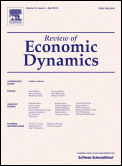
REVIEW OF ECONOMIC DYNAMICS
Transforming Economic Analysis for a Changing WorldREVIEW OF ECONOMIC DYNAMICS, published by Academic Press Inc, Elsevier Science, is a leading academic journal in the field of economics and econometrics, holding a distinguished Q1 ranking in its category as of 2023. With an impactful focus on the theoretical and empirical analysis of dynamic economic systems, the journal seeks to advance our understanding of economic dynamics through innovative research that addresses contemporary issues and policy implications. The journal boasts a significant history of contributions from renowned scholars since its inception in 1998, and will continue to publish through 2025. Although it does not currently offer open access options, the journal serves as a crucial resource for researchers, professionals, and students who are keen to explore and engage with the latest findings in economic theory and practice. With a current Scopus rank of #280 out of 716 in the Economics and Econometrics category, the REVIEW OF ECONOMIC DYNAMICS remains an invaluable platform for scholarly discussion and insight into the complexities of economic behavior.

Istanbul Iktisat Dergisi-Istanbul Journal of Economics
Fostering Innovative Insights for Global EconomiesIstanbul Iktisat Dergisi-Istanbul Journal of Economics, published by ISTANBUL UNIVERSITY, is a prominent journal that serves as a platform for innovative and thought-provoking research in the field of economics. As an Open Access journal since 2010, it aims to enhance the dissemination of knowledge by providing free access to high-quality research outputs, ensuring that scholars and practitioners around the globe can engage with the latest findings. The journal covers a wide range of economic topics, fostering interdisciplinary dialogue and contributing to both academic discourse and practical applications in economic policy. With a commitment to excellence, the journal seeks to attract submissions from both established and emerging researchers, offering insights that are vital for understanding the complexities of economic systems. With its ISSN 2602-4152 and E-ISSN 2602-3954, the Istanbul Journal of Economics stands out as an essential resource in the economics field, fostering meaningful research contributions and collaborations.
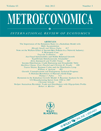
Metroeconomica
Advancing Economic Insights since 1949.Metroeconomica is a prestigious journal published by WILEY, focusing on the dynamic fields of Economics and Econometrics. Known for its rigorous peer-review process, this journal prides itself on disseminating high-quality research that informs and inspires scholars and practitioners alike. With an impact factor reflective of its significance in the discipline, Metroeconomica is categorized in the Q2 quartile for 2023, representing its competitive standing among influential economics publications. Since its inception in 1949 and continuing through a converged publication period until 2024, it has contributed significantly to advancing theoretical and empirical knowledge in economics. Researchers can access its content through traditional avenues, encouraging a wide readership among academics and industry experts. As the journal continues to evolve with the changing landscape of economic research, it remains a vital resource for those seeking to explore contemporary economic issues and foster impactful discussions within the field.
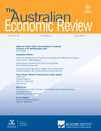
Australian Economic Review
Exploring the Depths of Economic Knowledge Since 1968.Australian Economic Review, published by Wiley, serves as a vital platform for the dissemination of high-quality research in the field of economics and econometrics. With a rich history dating back to its inception in 1968 and continuing through to 2024, this journal holds a respectable position within the academic community, evidenced by its recent categorization in the Q3 quartile for its contributions to the subject area, and its Scopus rank of #432 out of 716 in the field. This makes it a noteworthy resource for researchers, academics, and professionals striving to stay at the forefront of economic discourse. While it does not currently offer open access options, the journal is committed to providing insightful analyses, empirical studies, and comprehensive reviews that cater to both theoretical and practical aspects of economic research. By fostering an environment for rigorous scholarship, the Australian Economic Review plays a crucial role in advancing understanding and innovation in the ever-evolving field of economics.
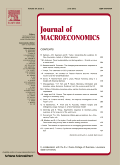
JOURNAL OF MACROECONOMICS
Exploring the Dynamics of Global EconomiesJOURNAL OF MACROECONOMICS, published by Elsevier, stands as a significant platform for scholarly discourse in the field of economics and econometrics. With an ISSN of 0164-0704 and an E-ISSN of 1873-152X, this journal has been actively contributing to the academic community since 1979 and continues to publish impactful research through 2024. It is recognized within the Q2 category for Economics and Econometrics in its 2023 quartile rankings, and it holds a respectable Scopus ranking of #353 out of 716 in its field, placing it in the 50th percentile. Despite not being an open-access journal, it provides valuable insights into macroeconomic theories, empirical assessments, and policy implications, making it an essential resource for researchers, professionals, and students aiming to deepen their understanding of macroeconomic dynamics. To access a breadth of contemporary research and enhance your academic pursuits, consider diving into the latest issues of this esteemed journal, conveniently located in Amsterdam, Netherlands, at RADARWEG 29, 1043 NX.
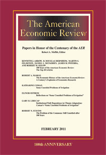
AMERICAN ECONOMIC REVIEW
Advancing Knowledge in Economics and Econometrics.AMERICAN ECONOMIC REVIEW, published by the American Economic Association, stands as one of the most prestigious academic journals in the field of Economics and Econometrics. With an impressive impact factor and ranking of #9 out of 716 in its category, this journal has achieved a notable position within the top 2% of journals globally, as evidenced by its Q1 classification in 2023. Covering a broad spectrum of economic theory and applied research, it serves as a primary platform for the dissemination of high-quality scholarly work, contributing significantly to the ongoing dialogue within the discipline. Although Open Access options are not available, the journal's rigorous peer-review process ensures that published articles uphold the highest standards of academic integrity and relevance. With coverage spanning from 1973 to 2024, the AMERICAN ECONOMIC REVIEW continues to be an essential resource for researchers, professionals, and students eager to stay at the forefront of economic thought and innovation.
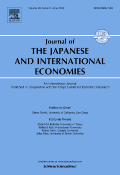
JOURNAL OF THE JAPANESE AND INTERNATIONAL ECONOMIES
Advancing Insights into Japan and Global EconomiesJOURNAL OF THE JAPANESE AND INTERNATIONAL ECONOMIES, a prestigious publication from Academic Press Inc. Elsevier Science, has been a vital contributor to the fields of economics, finance, and political science since its inception in 1987. With an impressive impact factor and recognized within the Q2 category for Economics and Econometrics as well as Finance, and Q1 for Political Science and International Relations, this journal serves as a critical platform for peer-reviewed research that influences both academic discourse and policy-making. The journal is indexed in Scopus, evidencing its prominent position within the scholarly community, with notable rankings of #56 in Political Science and #72 in Finance. Authors and researchers are encouraged to submit their work, contributing to the rich tapestry of knowledge surrounding the economic dynamics of Japan and the broader international landscape. Though it does not offer open access, the journal's subscription model ensures a wide dissemination of its impactful articles, making it essential reading for those aimed at deepening their understanding of economic interrelations and current global issues.
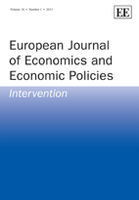
European Journal of Economics and Economic Policies-Intervention
Connecting research to policy for a better economic future.European Journal of Economics and Economic Policies-Intervention is a leading academic journal published by Edward Elgar Publishing Ltd, focusing on the intersection of economics and policy-making. Established in 2004 and set to continue through 2024, the journal is dedicated to fostering innovative research and providing a platform for interdisciplinary dialogue within the realms of economics and finance. With an H-index that reflects citation impact, it is indexed in Scopus, showcasing a respectable rank in both Economics and Econometrics, as well as Finance, categorizing it in the Q3 quartile. This journal targets a diverse readership, including researchers, professionals, and students, offering valuable insights and findings that shape economic thought and policy across Europe and beyond. While the journal operates under a subscription model, it remains committed to delivering high-quality scholarship that contributes significantly to the fields of economics and economic policies. As it continues to grow in influence, European Journal of Economics and Economic Policies-Intervention stands out as a vital resource for those seeking to understand and impact economic interventions in a rapidly evolving landscape.
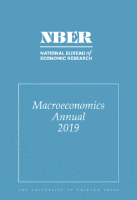
NBER Macroeconomics Annual
Exploring the Depths of Economic InsightsNBER Macroeconomics Annual is a premier publication in the field of macroeconomics, disseminating pivotal research that contributes to the understanding of economic phenomena and frameworks. Published by the esteemed University of Chicago Press, this journal provides an annual platform for scholars to present their findings, primarily covering topics relevant from 1996 to 2024, including diverse macroeconomic analyses and empirical studies. While it currently does not offer open access, the journal is widely recognized for its rigorous peer-review process and influential contributions, reflected in its Scopus rank of #171 out of 716 in the field of Economics and Econometrics, placing it in the 76th percentile. The NBER Macroeconomics Annual is crucial for researchers, professionals, and students seeking to expand their knowledge in economic theory and practice, enhancing both academic discourse and practical applications in the global economy.
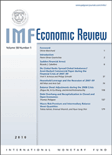
IMF Economic Review
Pioneering Research that Challenges Conventional Economic ParadigmsIMF Economic Review, published by Palgrave Macmillan Ltd, stands as a preeminent journal in the fields of Economics and Business Management, holding a prestigious Q1 ranking in both categories as of 2023. With an ISSN of 2041-4161 and an E-ISSN of 2041-417X, this journal not only showcases high-quality, peer-reviewed research but also embraces the principles of Open Access, promoting wide dissemination of its findings to researchers, professionals, and students alike. Spanning significant years from 2010 to 2024, the IMF Economic Review features innovative analyses and insights that challenge conventional economic paradigms and foster deeper understanding of global economic dynamics. Its impressive Scopus ranking places it in the top 10% of economics journals globally, affirming its vital role in advancing academic discourse and practical application in economics and finance. For those dedicated to exploring the intricacies of economic theory and practice, the IMF Economic Review is an invaluable resource that not only informs but also inspires.